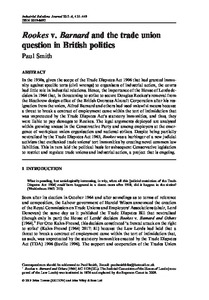Rookes v. Barnard and the trade union question in British politics

2019
50
5-6
November
431-449
labour relations ; labour dispute ; trade union role ; history
Labour relations
https://doi.org/10.1111/irj.12269
English
Bibliogr.
"In the 1950s, given the scope of the Trade Disputes Act 1906 that had granted immunity against specific torts (civil wrongs) to organisers of industrial action, the courts had little role in industrial relations. Hence, the importance of the House of Lords decision in 1964 that, in threatening to strike to secure Douglas Rookes's removal from the Heathrow design office of the British Overseas Aircraft Corporation after his resignation from the union, Alfred Barnard and others had used unlawful means because a threat to break a contract of employment came within the tort of intimidation that was unprotected by the Trade Disputes Act's statutory immunities, and thus, they were liable to pay damages to Rookes. The legal arguments deployed are analysed within growing unease in the Conservative Party and among employers at the emergence of workplace union organisation and national strikes. Despite being partially neutralised by the Trade Disputes Act 1965, Rookes was a harbinger of a new judicial activism that outflanked trade unions' tort immunities by creating novel common law liabilities. This in turn laid the political basis for subsequent Conservative legislation to restrict and regulate trade unions and industrial action, a project that is ongoing."
Digital
The ETUI is co-funded by the European Union. Views and opinions expressed are however those of the author(s) only and do not necessarily reflect those of the European Union or the ETUI.